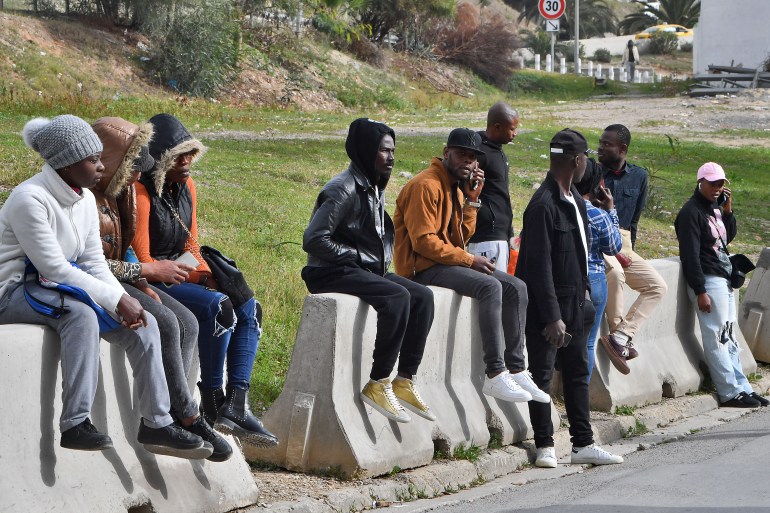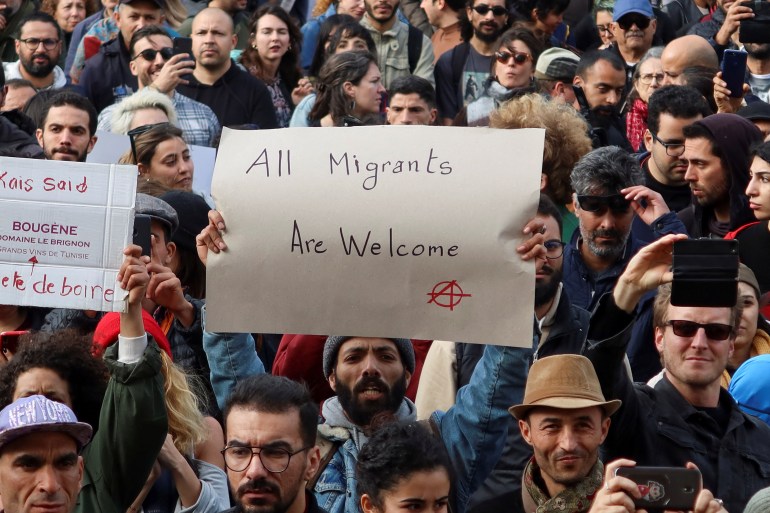President Kais Saied says ‘hordes’ of sub-Saharan migrants are causing crime and pose a demographic threat to the North African country, leading to accusations of racism and demonstrations.
Thank you for reading this post, don't forget to subscribe!Hundreds of people have protested on the streets of the Tunisian capital to denounce President Kais Saied, accusing him of racist comments and hate speech against refugees.
The demonstrators marched on Saturday to denounce racism and demand that the president apologise for his remarks, which included claims of a plot to erase Tunisia’s identity by overrunning it with sub-Saharan Africans.
As the situation becomes tenser and riskier for sub-Saharan Africans in Tunisia, AFP reported on Saturday that Ivorians were heading to their embassy in Tunis to ask for help leaving the country.
Here is what you need to know about the protests:
Who are the sub-Saharan people living in Tunisia?
Tunisia is a key departure point for refugees trying to reach Europe on what the United Nations says is the world’s deadliest migration route.
The country lies about 130km (80 miles) from the Italian island of Lampedusa at its closest point.
More than 21,000 sub-Saharan Africans live in Tunisia, including those with student visas and other legal residencies, according to the FTDES advocacy group, which cited official figures.
Many people from Cameroon, Ghana, Guinea and the Ivory Coast work in poorly paid, informal jobs to get by and save up for attempts to reach Italy.

What did Saied say?
At a meeting of the National Security Council on Tuesday, Saied said “hordes” of sub-Saharan migrants were causing crime and posed a demographic threat to Tunisia.
He said “urgent measures” were needed to address the entry of people from sub-Saharan countries, accusing them of “violence” and “crimes”.
“The undeclared goal of the successive waves of illegal immigration is to consider Tunisia a purely African country that has no affiliation to the Arab and Islamic nations,” Saied claimed.
He alleged that unnamed parties had settled sub-Saharan Africans in Tunisia over the past decade in return for money, according to comments published by the presidency online.
Dozens of sub-Saharan Africans have been arrested this month in a major crackdown.
What has the reaction been in Tunisia?
The protesters on Saturday denounced Saied’s comments and the actions taken against migrants by authorities.
“Down with fascism, Tunisia is an African country,” they chanted. “President of shame, apologise,” they demanded.
Artists, human rights activists and members of civil society groups took part in the rally.
Romdhane Ben Amor, a spokesperson for the Tunisian Forum for Social and Economic Rights, said the number of racist assaults against sub-Saharan Africans had increased after Saied’s remarks.

“We noted attempts to drive some migrants out of their homes,” he told AP news agency. “Others are being prevented from taking public transportation.”
Tunisian comedian Fatma Saidane denounced “deplorable actions” targeting some sub-Saharan people and called on people to show a civic-minded attitude.
“We must not assault or insult people who live on our soil in the same way we don’t accept our compatriots to be ill-treated in Europe,” she said, according to AP.
The Saied government has come under severe criticism from opposition and human rights groups in recent months for arresting political opponents who have criticised his rule and the economic woes the North African country finds itself in.
In July 2021, Saied shut down parliament, dismissed the government and moved to rule by decree before rewriting the constitution, moves his critics call a coup that has pulled apart the democracy built after Tunisia’s 2011 revolution.
What has been the reaction in Africa?
The African Union has condemned Tunisia and urged it to avoid “racialised hate speech”.
“The Chairperson of the African Union Commission HE Moussa Faki Mahamat strongly condemns the shocking statement issued by Tunisian authorities targeting fellow Africans which go against the letter and the spirit of our Organization and founding principles,” a statement from the African Union said.
It reminded Tunisia of its obligations within the 55-member bloc. Faki said member states are obligated “to treat all migrants with dignity, wherever they come from; refrain from racialised hate speech that could bring people to harm; and prioritise their safety and human rights”.

